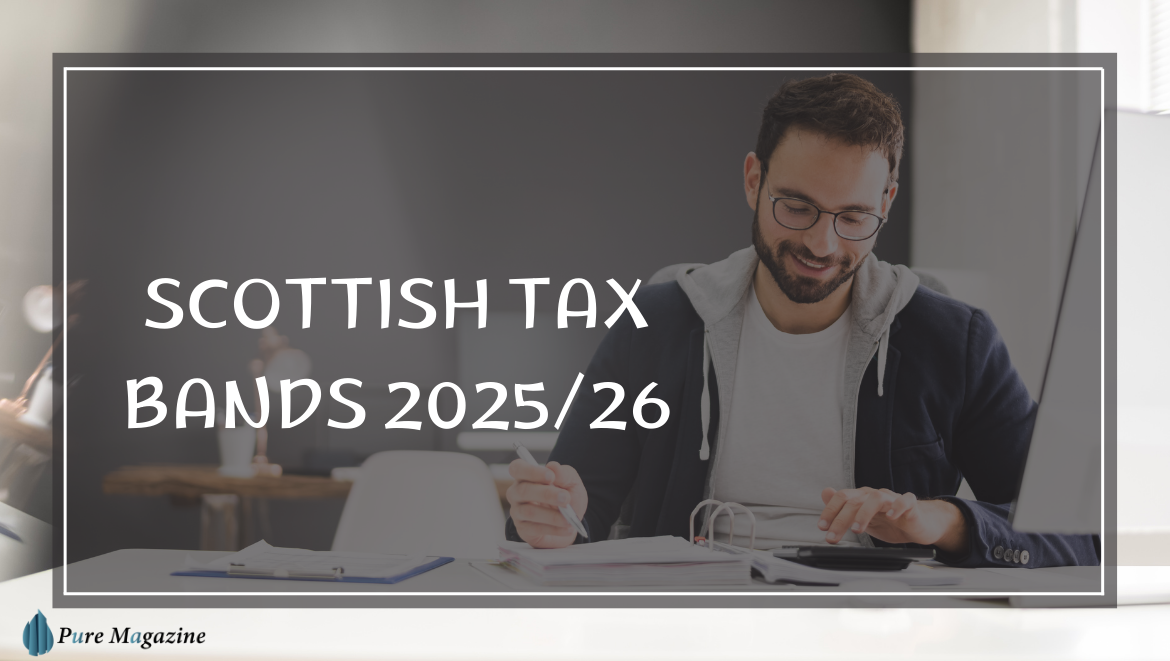You open your payslip, and your eyes widen. More tax than expected has disappeared from your salary. If you live in Scotland, this confusion is common—and completely understandable. Scotland’s tax system has its own set of rules, different from the rest of the UK, and knowing these tax bands can save you money, stress, and countless headaches.
Think of Scottish taxes bands like a layered cake: each layer has its own flavour (or rate), and how much you pay depends on which layers your income fills. Let’s dig in.
Understanding Scottish Tax Bands
Scotland sets its own income tax rates and bands, separate from England, Wales, or Northern Ireland. These bands determine how much tax is deducted from each slice of your earnings.
Here’s a detailed look at the 2025/26 Scottish tax bands:
| Band | Income Range (£) | Tax Rate |
|---|---|---|
| Starter Rate | 12,571 – 14,732 | 19% |
| Basic Rate | 14,733 – 25,688 | 20% |
| Intermediate Rate | 25,689 – 43,662 | 21% |
| Higher Rate | 43,663 – 125,140 | 41% |
| Top Rate | 125,141+ | 46% |
Personal Allowance: £12,570. This part of your income is tax-free. Picture this: you’re walking along Princes Street in Edinburgh, sipping your morning coffee, and thinking about your paycheck. That little personal allowance cushion is like your safe zone—it protects the first £12,570 from taxation. Learn more about managing your allowance through your Personal Tax Account.
How Your Income is Taxed
Scottish tax isn’t a flat rate. Your income moves through different bands, like water flowing down steps—each step with a different rate.
Example: Sarah earns £35,000 annually:
- £12,570 → tax-free
- £12,571–14,732 → 19% = £410
- £14,733–25,688 → 20% = £2,191
- £25,689–35,000 → 21% = £1,955
Total tax: £4,556.
Imagine watching these chunks being siphoned off in your mind. It might sting, but now you know exactly why.
Scottish Tax vs England: What Changes
If you move from England to Scotland, your pay may feel lighter, even with the same salary. Why? The rates differ:
| Band | Scotland | England & Wales |
|---|---|---|
| Basic | 20% | 20% |
| Higher | 41% | 40% |
| Top | 46% | 45% |
Mini-story: Alex relocated from London to Glasgow, excited about his new role. His first paycheck? Surprise! More tax was deducted than expected. Why? Scotland’s higher rate kicks in earlier, at £43,663. That’s like walking into a café and realizing your latte costs a pound more than advertised.
Scottish Council Tax: The Other Slice
Income tax is just part of the story. Council tax is based on your property’s value, and it varies depending on your local council.
- Bands range from A to H, with A being the lowest and H the highest.
- It funds schools, roads, waste collection, and other local services.
- You can appeal your band if your property is overvalued.
Imagine living in a cozy flat in Leith, thinking about what you’re paying. That appeal could save you hundreds, so it’s worth checking.
Common Problems and How to Navigate Them
Overpaying Taxes
It happens more often than you think. Sometimes your PAYE code is wrong, or you’ve been put on an OT (Out of Tax) band by mistake. The result? You end up giving HMRC more than you should.
What to do: Double-check your tax code, make sure your personal allowance is applied correctly, and contact HMRC if anything looks off. A few minutes now could save you hundreds later.
Multiple Income Streams
Freelance work, dividends, and your main salary—if you don’t align them properly, taxes can get messy.
What to do: Consider using self-assessment to report all your incomes in one place. Online calculators are a lifesaver for understanding exactly how much tax you owe.
Relocating Between Regions
Moving from England, Wales, or Northern Ireland to Scotland? Don’t assume your tax will stay the same. Regional differences mean higher rates might kick in earlier than you expect.
What to do: Update your address with HMRC and double-check your tax code to avoid surprises.
Pro Tip: Use online tax calculators as your financial compass—they help you navigate this maze and avoid overpaying.
FAQs
Q: What are Scottish tax rates for 2025/26?
A: Starter 19%, Basic 20%, Intermediate 21%, Higher 41%, Top 46%. Personal allowance: £12,570.
Q: Can I appeal my council tax band?
A: Yes. If your property seems overvalued, submit a review request.
Q: How are dividends taxed in Scotland?
A: Separately, depending on total income, not your Scottish income tax bands.
Q: Will moving to Scotland reduce my take-home pay?
A: Possibly, especially if your salary crosses higher or top-rate bands sooner than in England.
Final Verdict
Taxes may feel like a maze, but understanding Scottish tax bands gives you control. Knowing where your income falls helps you plan better, avoid overpaying, and make smarter financial decisions.
Scotland’s rates differ from the rest of the UK, so always check your personal allowance, review your PAYE code, and use tools like this official HMRC page or MyGov Scotland. Stay informed, appeal your council tax if necessary, and manage your money with confidence.
Remember: you can’t escape taxes, but you can escape confusion. Check your bands, plan ahead, and keep more of your hard-earned cash.
Visit: Pure Magazine

